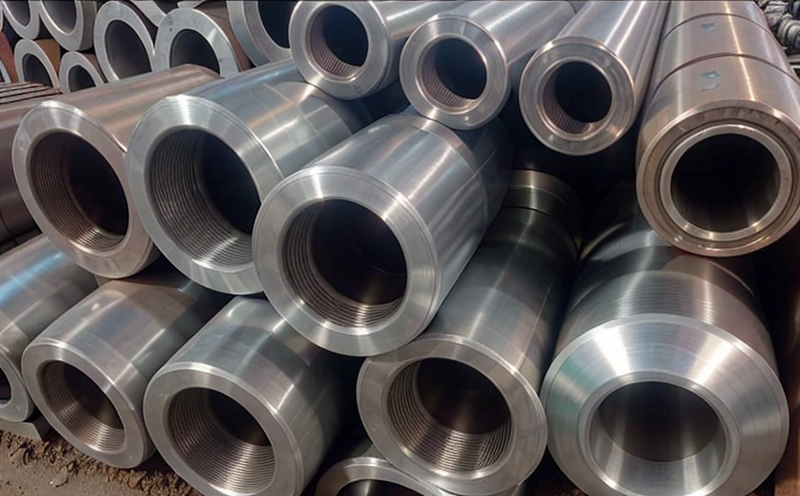DIN EN 60068-2-1 Cold Temperature Durability Test
The DIN EN 60068-2-1 standard pertains to environmental testing for electrical and electronic equipment. Specifically, it addresses the cold temperature durability test, which is crucial for assessing the performance of ferrous metals and alloys under low temperatures.
Testing ferrous metals in accordance with this standard ensures that they are capable of maintaining their structural integrity and mechanical properties when exposed to cold environments. This is particularly important for components used in HVAC equipment where materials must withstand extreme conditions without degradation or failure.
The test involves exposing the specimen to a specified temperature range over a defined time period, followed by recovery at room temperature before re-exposure. The objective is to evaluate how well the material retains its mechanical properties such as tensile strength, hardness, and ductility after being subjected to repeated cycles of low temperatures.
For ferrous metals like steel used in HVAC systems, this test can help identify potential weaknesses that could lead to premature failure or reduced lifespan under operational conditions. By adhering strictly to the specified parameters outlined in DIN EN 60068-2-1, manufacturers can ensure their products meet international quality standards.
The testing procedure typically involves placing samples within a controlled environment chamber capable of simulating real-world cold temperatures relevant to the application field. Specimens undergo multiple cycles of temperature cycling between room temperature and the specified low point, usually around -40°C.
During each cycle, precise control over heating rates ensures accurate simulation of actual environmental changes. After completing all cycles, the specimens are inspected for any visible signs of damage or alteration in their physical characteristics. Acceptance criteria vary depending on specific requirements but generally include no observable cracks, deformations, or significant loss in mechanical properties.
This rigorous testing process helps manufacturers develop robust materials suitable for use in challenging environments, enhancing overall product reliability and safety. Compliance with DIN EN 60068-2-1 contributes significantly to achieving these goals by providing a standardized method for evaluating cold temperature durability.
Applied Standards
| Standard | Description |
|---|---|
| DIN EN 60068-2-1 | Cold temperature durability test for electrical and electronic equipment. |
| ISO 7253 | General requirements for the mechanical testing of metals. |
| ASTM E494 | Standard practice for tensile testing of metallic materials. |
| EN ISO 68-1 | Environmental test methods; general principles and terminology. |
Eurolab Advantages
At Eurolab, we offer comprehensive DIN EN 60068-2-1 testing services tailored specifically for ferrous metals and alloys used in HVAC equipment. Our experienced team of technicians ensures that every test adheres strictly to the specified parameters ensuring accurate results.
We employ state-of-the-art facilities equipped with high precision measurement instruments capable of maintaining stringent temperature controls throughout the entire process. This guarantees reliable data that can be relied upon for making informed decisions regarding material selection and design optimization.
Our laboratory follows strict quality assurance procedures to maintain consistency across all tests conducted here. By choosing Eurolab, you benefit from our expertise in providing precise, repeatable results consistently meeting or exceeding international standards like DIN EN 60068-2-1.
Why Choose This Test
The cold temperature durability test is essential for ensuring the reliability and longevity of ferrous metals used in HVAC equipment. Here are some key reasons why it's important:
Enhanced Reliability: By subjecting materials to extreme cold conditions, this test helps uncover any potential weaknesses or vulnerabilities that might not be apparent under normal operating temperatures.
Prolonged Lifespan: Testing ensures that the chosen ferrous metals can endure harsh environmental conditions without succumbing to corrosion or other forms of degradation. This leads to longer-lasting products with improved durability.
Better Design Optimization: Through thorough evaluation, engineers gain valuable insights into material behavior under cold stress which allows them to refine designs for better performance and efficiency.
Regulatory Compliance: Adherence to international standards like DIN EN 60068-2-1 ensures compliance with regulatory requirements thus protecting your company from legal issues related to non-compliance.
Informed Decision Making: Accurate testing results provide clear evidence about the suitability of different ferrous metals for specific applications thereby aiding in better decision making processes within organizations involved in HVAC equipment manufacturing and design.





